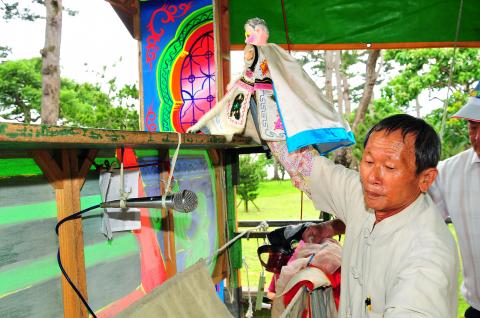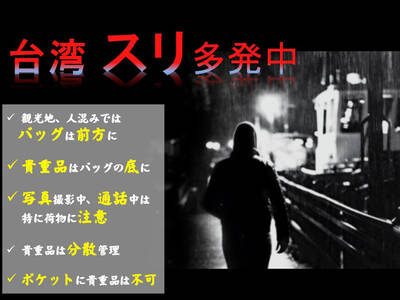Despite being 72 years old, puppeteer Tsai Tsai-shun (蔡財順) is still performing and said that he hoped to continue until he could no longer walk.
Tsai has more than 50 years of experience in Taiwanese glove puppetry, commonly known as budaixi (布袋戲), and is one of a handful of people in Hualien County’s Jian Township (吉安) who can still narrate scenes from memory.
Tsai was recently invited by Tzu Chi University’s Department of Communication Studies to perform with his mini-actors and said he was able to keep the story running as he continued to act out fighting scenes, with the occasional blast of dry ice helping to enhance the simple style of traditional arts.

Photo: Hua Meng-ching, Taipei Times
Tsai said that he has been in love with glove puppetry since he was a youth, and when he was 17 he was taken on as an apprentice in the trade. He then spent over three years on the road learning this unique trade.
Tsai said that he learned his skills when there was no television, but open-air impromptu theaters in rural villages — often located in front of temples — put on Taiwanese Opera and glove puppetry shows. Many times, he added, he would also be hired to perform at ceremonies at temples celebrating the birthdays of various deities.
A witness to the gradual decline of the traditional art of glove puppetry, Tsai said that in the old days a troupe would consist of four or five people, with two moving the puppets, and a narrator.
Thirty years ago, Tsai said, a troupe like that could have commanded NT$7,000 to NT$8,000 per day, which was a good deal of money at the time.
However, the cost to hire a troupe is still the same today. As a result people have quit the profession and the tradition is dying out, Tsai said.
Nowadays troupes usually consist of one or two people who have to take on virtually all the tasks associated with staging a production, with the music and narration delegated to recordings, Tsai said.
Modern technology and diminished wages mean that the art of puppetry is not what it used to be, Tsai said.
Translated by Jake Chung, Staff Writer

GENSLER SURVEY: ‘Economic infrastructure is not enough. A city needs to inspire pride, offer moments of joy and foster a sense of belonging,’ the company said Taipei was named the city with the “highest staying power” in the world by US-based design and architecture firm Gensler. The Taiwanese capital earned the top spot among 65 cities across six continents with 64 percent of Taipei respondents in a survey of 33,000 people saying they wanted to stay in the city. Rounding out the top five were Vietnam’s Ho Chi Minh City (61 percent), Singapore (59 percent), Sydney (58 percent) and Berlin (51 percent). Sixth to 10th place went to Monterrey, Mexico; Munich, Germany; Sao Paulo, Brazil; Vancouver; and Seoul. Cities in the US were ranked separately, with Minneapolis first at

The Japan-Taiwan Exchange Association has cautioned Japanese travelers to be vigilant against pickpockets at several popular tourist spots in Taiwan, including Taipei’s night markets, the Yongkang Street area, Zhongshan MRT Station, and Jiufen (九份) in New Taipei City. The advisory, titled “Recent Development of Concerns,” was posted on the association’s Web site under its safety and emergency report section. It urges travelers to keep backpacks fully zipped and carried in front, with valuables placed at the bottom of the bag. Visitors are advised to be especially mindful of their belongings when taking photos or speaking on the phone, avoid storing wallets and

ENDORSING TAIWAN: Honduran presidential candidate Nasry Afura said that Honduras was ‘100 times better off’ when it was allied with Taipei The Ministry of Foreign Affairs yesterday said it would explore the possibility of restoring diplomatic relations with Honduras based on the principle of maintaining national interests and dignity. The ministry made the remarks in response to reporters’ questions regarding an article titled: “Will Taiwan Regain a Diplomatic Ally?” published in The Diplomat on Saturday. The article said Honduras’ presidential election in November could offer Taiwan the chance to regain an ally, as multiple candidates have promoted re-establishing diplomatic relations with Taiwan. Honduras severed diplomatic ties with Taiwan in March 2023 in favor of Beijing, but since switching its diplomatic recognition,

Scoot announced yesterday that starting in October, it would increase flights between Taipei and Japan’s Narita airport and Hokkaido, and between Singapore and Taipei. The low-cost airline, a subsidiary of Singapore Airlines, also said it would launch flights to Chiang Rai in Thailand, Okinawa and Tokyo’s Haneda airport between December and March next year. Flights between Singapore and Chiang Rai would begin on Jan. 1, with five flights per week operated by an Embraer E190-E2 aircraft, Scoot said. Flights between Singapore and Okinawa would begin on Dec. 15, with three flights per week operated by Airbus A320 aircraft, the airline said. Services between Singapore